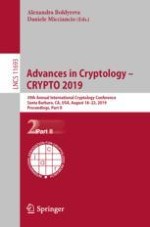2019 | OriginalPaper | Buchkapitel
Adaptively Secure MPC with Sublinear Communication Complexity
verfasst von : Ran Cohen, Abhi Shelat, Daniel Wichs
Erschienen in: Advances in Cryptology – CRYPTO 2019
Aktivieren Sie unsere intelligente Suche, um passende Fachinhalte oder Patente zu finden.
Wählen Sie Textabschnitte aus um mit Künstlicher Intelligenz passenden Patente zu finden. powered by
Markieren Sie Textabschnitte, um KI-gestützt weitere passende Inhalte zu finden. powered by
Abstract
-
A two-round secure function evaluation (SFE) protocol in the CRS model, assuming LWE and indistinguishability obfuscation (iO). The communication, the CRS size, and the online-computation are sublinear in the size of the function. The iO assumption can be replaced by secure erasures. Previous results required either the communication or the CRS size to be polynomial in the function size.
-
Under the same assumptions, we construct a “Bob-optimized” 2PC (where Alice talks first, Bob second, and Alice learns the output). That is, the communication complexity and total computation of Bob are sublinear in the function size and in Alice’s input size. We prove impossibility of “Alice-optimized” protocols.
-
Assuming LWE, we bootstrap adaptively secure NIZK arguments to achieve proof size sublinear in the circuit size of the NP-relation.
